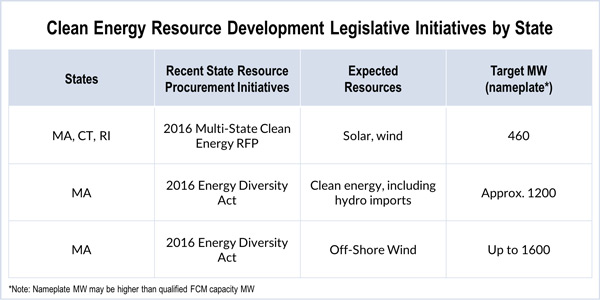By Michael Kuser
The Conservation Law Foundation last week asked ISO-NE to override its member states and conduct a study to determine transmission needs driven by state renewable energy and carbon reduction policies.
In a letter May 16, CLF Senior Attorney David Ismay criticized a May 1 submission from the New England States Committee on Electricity as “legally insufficient for purposes of the regional system planning determinations that [FERC] Order 1000 requires.”
NESCOE concluded that there are no state or federal public policy requirements (PPRs) “driving transmission needs relating to the New England transmission system.”
Ismay argued that the NESCOE submission provided “no regional analysis, no discussion of the Regional System Plan process or timing, and no discussion of the regional impact that stakeholder-identified PPRs are likely to have collectively on regional transmission between 2018 and 2027, the relevant regional planning period.”
ISO-NE asked for comments on state, federal and local PPRs driving transmission needs in January. Responding, in addition to NESCOE and CLF, were Avangrid, National Grid, NextEra Energy Transmission and TDI-New England, all of which called for the RTO to conduct a study. (See ISO-NE Begins Discussing Order 1000 Public Policy Tx Projects.)
States: No Current Public Policy Tx Needs
NESCOE’s response, which dismissed the companies’ rationale, was accompanied by memos from each of the states, none of which called for a study.
Connecticut, for example, noted that two recent solicitations for renewable energy and demand response resulted in the selection of nine projects, none of them involving transmission. It also said it was meeting its greenhouse gas reduction targets and that while “far deeper cuts” will be needed to meet the 2050 target — 80% below 2001 levels — no new transmission is currently required.
The Massachusetts Department of Public Utilities acknowledged that the state’s requirement that electric distribution companies sign long-term contracts for 9.45 million MWh of clean energy annually by 2022 and 1,600 MW of offshore wind generation by 2027 “may drive the need for transmission infrastructure in the future.”
“However, because we presently lack clarity regarding the outcome of the solicitations and any projects that may result from the … solicitations, we find it inappropriate to request a public policy transmission study at this time,” the state said.
Rhode Island said its electric retailers are meeting the state’s renewable energy standard, which requires them to obtain 11.5% of power from renewable sources in 2017, without the need for new transmission. Although the standard rises to 38.5% by 2035, the state said “local renewable distributed generation resources are projected to produce a substantial quantity of [renewable energy certificates] in the coming years, regardless of actual or perceived regional transmission needs.”
Vermont said that its “statutes and policies not only do not drive transmission needs, but rather endeavor to avoid the need for increased transmission. The reason for this policy is to protect ratepayers from the significant costs of building new transmission projects where the particular need can be served more economically by a non-transmission alternative.”
Ismay wrote that the “NESCOE submission simply forwards to ISO-NE individual state-centric analyses by each of the six New England states, all of which expressly disclaim or avoid the type of long-range regional assessment Order 1000 requires.”
Court Rebuff of NESCOE
Ismay said a D.C. Circuit Court of Appeals ruling in April confirmed the responsibility of ISO-NE, “not the states, to evaluate transmission needs and potential solutions as part of its Regional System Plan process, regardless of whether those transmission needs arise from state public policy requirements or any other source” (Emera Maine v. FERC, No. 15-1139). (See Court Rebuffs New England TOs, Upholds FERC ROFR Order.)
The court rejected NESCOE’s claim that FERC’s ISO-NE compliance order went beyond Order 1000 and “impermissibly altered the balance of responsibility and power” between the states and the RTO.
“ISO-NE has no role in setting public policy for the states,” the court said. “ISO-NE considers transmission needs that arise from a variety of sources, one of which is the public policy requirements chosen by federal and state officials.”
Ismay asserted in his letter that “ISO-NE itself has already repeatedly recognized” that transmission will likely be needed to deliver new renewable and low-carbon resources required to meet the carbon emission reduction goals of Connecticut and Massachusetts. He cited the grid operator’s January 2017 Regional Electricity Outlook, which stated that “connecting additional remote clean-energy resources is also going to require improvements on the transmission system.”
ISO-NE Director of Transmission Planning Brent Oberlin provided a status report on the RTO’s transmission planning evaluations during a conference call Friday of the Interregional Planning Stakeholder Advisory Committee for New England, NYISO and PJM.
“If the ISO decides that we will be moving forward with a public policy transmission study, we need to provide a scope to stakeholders by Sept. 1,” Oberlin said. “We do plan on having some discussion on the ISO’s going-forward plan at our June Planning Advisory Committee meeting.”





